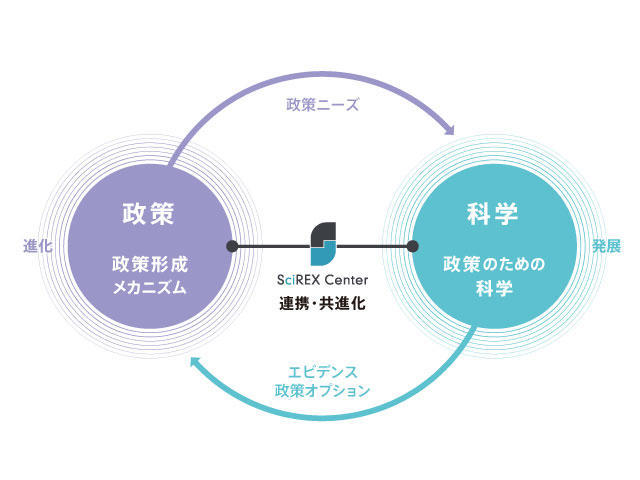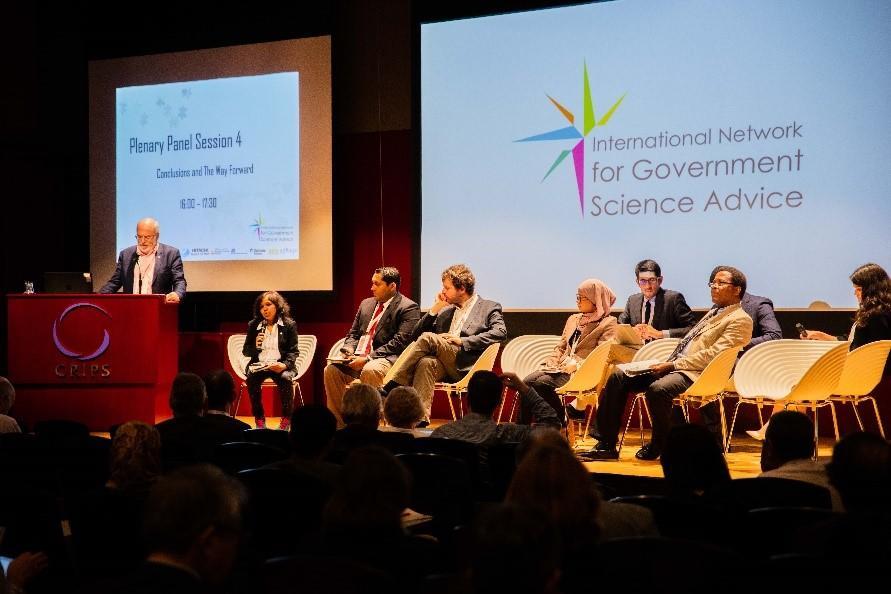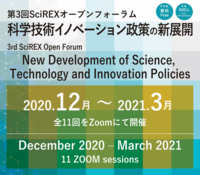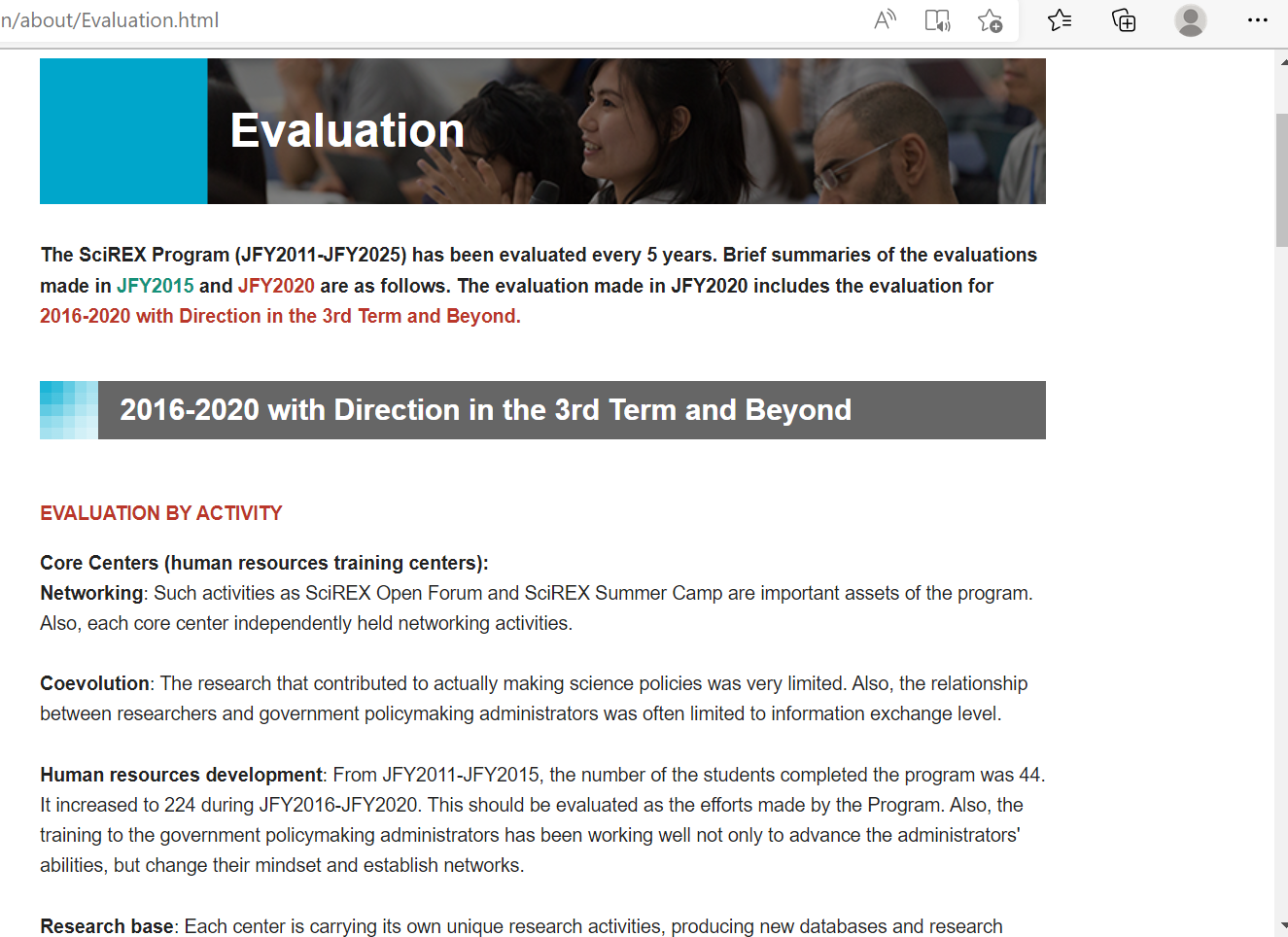History
Launched in 2011, the SciREX program aims to make effective policies through various analyses by working in tandem with the government administrators who are actually making Science, Technology and Innovation (STI) policies. In an effort to attain the goal, the program carries out various activities related to STI policymaking, including conducting research work and offering human resources training at its core center universities. Also, the Research Institute of Science and Technology for Society (RISTEX) joines the SciREX program through its competitive program named Science of Science, Technology and Innovation Policy.
-

SciREX Program Launched
Highlights: Based on the strategy proposed by the Japan Science and Technology Agency (JST)'s Center for R&D Strategy (CRDS), the SciREX program was launched. The activities started by the program included: (1) study of such organizations that are carrying related activities in and outside Japan, (2) "Structure Designing Meeting" that designs the details of the program and (3) management of a competitive program called for by JST's Research Institute of Science and Technology for Strategy (RISTEX). Eight successful projects awarded in the RISTEX framework as SciREX projects were:

RISTEXプロジェクト
・Development of methods for impact assessment of electric power innovation and R&D network evaluation
・Scientometrics conducive to management of funding programs
・Methodology development for visualization and quantification of social expectation to science and technology
・Research on scientific resources of innovation and economic impacts of science
・Integrating joint fact-finding into policy-making processes (IJFF)
・Study of innovation strategies conducive to creating future industries
・Identifying the needs for "potential concerns to S&T" for creating innovations
・Study on the macro-economic evaluation system for STI policiesReference: Establishment of "Science of STI policy" for evidence-based policymaking (in Japanese)
-

Core Centers for Basic Research and Human Resources Training
Highlights: To be prepared for implementing human resources training in 2013, five basic research and human resources training centers were established at: Graduate Institute for Policy Studies (GRIPS), the University of Tokyo, Hitotsubashi University, Osaka/Kyoto Universities, and Kyushu University.

RISTEX project
Seven SciREX projects were selected via RISTEX's competitive program.
・Framework for broad public engagement in STI Policy
・Development of the case-based reasoning system for regional S&T policy
・Economic growth analysis of science, technology and innovation policies
・Resource logistics as a support tool of STI policymaking decision
・Conservation and energy utilization of water as common resources for leading innovation
・Co-creation type STI policies, including medical care systems
・Methodology development to support R&D issue designing, using information engineering
NISTEP
National Institute of S&T Policy (NISTEP) started the following under "Science for STI policy":
・Establishment of data and information base
・Research on policy issue studies -

Human Resources Training Programs
Highlights: All the SciREX core centers called for participants in their human resources training programs. The Summer Camp 2013 was held with the faculty members and the students from all the core centers.

RISTEX project
Six SciREX projects were selected through RISTEX's competitive program:
・A study on methods for objective/quantitative assessment of the impact of satellite observations on environmental policy
・Action research for realizing innovation with infometric approach
・Scenario planning for making regulatory policies and technical standards in advanced medicine
・Resilience analysis for social safety policy
・Examination of the methods for designing, promoting, and evaluating interdisciplinary collaboration or merger of different academic fields
・Basic research on unifying the medical and health information and using it in societyThe academic journal "Research-Technology-Planning" published by the Society of Research and Innovation highlighted "Science for STI Policy" in its special issue: https://www.jstage.jst.go.jp/browse/jsrpim/28/1/_contents/-char/ja
-

SciREX Center Was Established
Highlights: The SciREX Center was established as the HUB of SciREX activities to collect the results born from various SciREX activities. The human resources training programs at the core centers accepted the 2nd round students. The Summer Camp 2014 was held in Awaji-shima island.

RISTEX project
The following five SciREX projects were selected via the competitive RISTEX program.
・Development of benchmarks of the quality of prior art search in international patent prosecution processes
・Establishment of methodology and database for life cycle-based environmental assessment and installation of the Society for the Promotion of Green Procurement
・Innovation in evidence-informed policy making: Through visualizing and re-designing social systems for countermeasures against regional disparity in healthcare quality
・Realizing policymaking process of infectious disease control using mathematical modeling technologies
・Development of the evidence-base for advanced risk management of living spaces -

Training for Incumbent Government Administrators
Highlights: A training program for the incumbent central government administrators in Japan started. This is one of the SciREX efforts to try to connect the STI policy research and the actual policymaking work. Also highlighted in this year was the MEXT's interim evaluation of the SciREX program.
-
Researcher-Policymaker Coevolution Research Projects: non-competitive
Highlights: Among the issues presented in the 5th S&T Basic Plan, the SciREX core centers began to try to solve the issues the SciREX program is concerned as below. The projects are going to be carried by the government policymakers and the SciREX members in tandem for both of them to co-evolve.





・Development of measurement of economic and societal effects
・ Identification and improvement of the systems at the public research institutions that promote innovation
・Strategic policy scenario to respond to the nationally critical issues
・ Policy formation framing, analyses of stakeholders, and improvement of policy formation process while establishing the process
・ Index for monitoring and improving policies
・ Industry-university-government collaboration to create innovation: knowledge management and system design
・ Establishment of policymaking support system for new STI and societal issues
・Visualization of local governments' school physical exam information and establishment of the database
・ Various measurements on STI and society, research on examples that may cause innovations in local areas and development of a system that supports policymakingBesides the above, to share with the community what kind of research theme the "Science for STI Policy" should pursue in the future, a workshop on the inventory, overview and structuring of SciREX activities was held. The materials used in the workshop include these. It has led to create the SciREX Core Contents that are the guidelines to be referred to at schools when making curricula of science, technology and innovation policy studies and other training opportunities. They are available online (only in Japanese) and subject to be reviewed and updated with the change of era.
-
SciREX Open Forum
Highlights: An open forum was held together with the STI policy-concerned government officials where such issues that can be reflected on the policies were discussed.

RISTEX project
Four SciREX projects selected this year through RISTEX competitive program are:
・System design to introduce energy-saving equipment for reinforcement of resilience
・ A metasystem approach to regulatory rule making on advanced medicine
・ Star scientists and innovation in Japan
・ An analysis of the factors that influence women and girls to pursue physics and mathematics -

International Networks
Highlights: A biannual conference of the International Network for Government Science Advice (INGSA) was co-sponsored by GIST, SciREX core center at GRIPS. Also, The SciREX core center at Kyushu University (CSTIPS) took part in organizing the World Social Science Forum (WSSF). These exemplify SciREX program's effort for establishing international networks. The training program for incumbent government administrators was modified to be more practical. More than 40 government administrators participated in it. Nine SciREX projects that started in 2016 (see the list under 2016) completed this year.

RISTEX project
Four SciREX projects through RISTEX program were selected:
・ Research on constructing open data for policies to reduce child poverty
・ Healthcare innovation driven by effective hospital-bed reductions and urban planning
・ Constructing a commons using ICT to generate evidence for medical policy
・ Biology-informed, family-friendly policies against declining birth rate in Japan -

Coevolution Projects started
With close collaboration between researchers and government administrators, coevolution projects began to conduct practical research that aims to produce concrete results to contribute to policymaking on critical issues. Nine coevolution projects that started in JFY2016 ended this year.
-

The 3rd SciREX Open Forum was held and a Follow-up Survey was made
To commemorate the 10th anniversary of the SciREX Program and to be prepared for the remaining 5 years, a Follow-up Survey was conducted to review the program's activities in the past decade. Also, the 3rd SciREX Open Forum with 10 sessions was held, having the theme of "New Development of Science, Technology and Innovation Policy," online due to the pandemic. At the same time, the evaluation for the 2nd term was undergoing.
-

SciREX Program's 2nd Term reviewed and the 3rd Term started
The SciREX Program entered into the 3rd term (JFY2021-JFY2025). The evaluation for the 2nd term (JFY2016-JFY2020) was made, based on which the core centers, SciREX Center, and other SciREX member organizations individually established their plans for the 3rd term and beyond.












